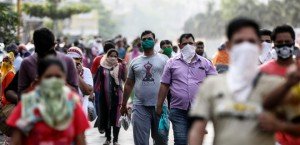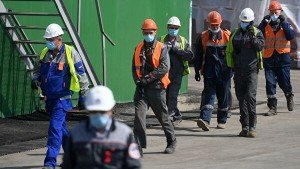Global migration policy changes in connection with COVID-19
The new focus on individual health security risk could have long-term implications for migrant workers and migration policy.
- The COVID-19 pandemic is causing a shift in migration rhetoric to include individual health security.
- Limitations on movement, while necessary to manage the virus, can make it difficult for migrants and asylum seekers to access protection, and may exacerbate inequality, discrimination and exploitation.
- This new migration rhetoric will have long-term implications for socioeconomic inclusion and social cohesion.
Migrant key workers continue to perform crucial tasks on the front lines of the global pandemic response. But the shutting down of economies, closure of borders and fear of the invisible enemy is leading to the hardening of migration policies around the world – and the rise of a new “health securitization” migration rhetoric.
While necessary to manage the fallout of the pandemic, limitations on the movement on people make it more difficult for asylum seekers and irregular migrants to access protection. As the civil war in Libya rages on – despite international calls for a “humanitarian pause” – asylum seekers and migrants have been turned away by European governments. Search-rescue-disembarkation operations in the Mediterranean have been brought to a halt, despite international maritime law dictating a “duty to rescue” refugees and asylum seekers in distress at sea. As per a report by Amnesty International, Malaysia and Thailand have actively pushed back and even turned away boats carrying Rohingya refugees fleeing persecution. The United States is closing access to anyone claiming asylum and arriving through the southern border with Mexico.
While the pandemic has brought attention to the criticality and vitality of migrant workers in many sectors of the economy – especially healthcare and agriculture – the longer-term impacts on immigrant policy seem to be heading towards more regulation of mobility and social inclusion. This may lead to an inflection point for globalisation, where models such as Singapore’s hub city model, the Schengen free-movement zone or even internal migration and urbanisation in India and China may require new flexibility and agility.
We are already witnessing the formation of “mobility bubbles”, such as the trans-Tasman bubble with relaxed border restrictions between Australia and New Zealand. Latvia, Lithuania and Estonia, which also successfully curtailed the spread of COVID-19, made a similar announcement. These “safe zones” not only pose a risk of furthering the securitization rhetoric against migrants from countries with a higher case load, but also lead to a new form of economic isolationism and globalization, where production lines and supply chains may shift to be localized within these bubbles to direct economic recovery and sustainability. Consequently, these shifts may reinforce existing inequalities and exacerbate the Global North-South divide.
This new migration rhetoric will have longer-term implications for socioeconomic inclusion and social cohesion in societies receiving immigrants. Stigmatization, misinformation and discrimination are already leading to a rise in xenophobia. Economies highly dependent on remittance cash-flows from their immigrant diaspora face the threat of job losses as well as deportation measures resulting from the enforcement of draconian immigrant policies. While nationals are supposed to stay at home and limit contact with the outside world, the reality for migrants is different. Some states have created a paradoxical “quasi-quarantine” – one in which migrants can and are supposed to work to support the survival of the economy even while contact with the outside world and interaction with locals are forbidden, and while curfew measures aimed at migrants restrict their access to basic care and services. This leads to a regime of segregation.
At the same time, despite these new barriers and restrictions, global migration may increasingly recede into the shadows – especially in economies with weaker health systems and rule of law, where smugglers, human traffickers and other illicit groups step in to exploit the desperation.
In the face of COVID-19, the rhetoric must change from discrimination to solidarity. The United Nations launched a campaign to fight misinformation and discrimination against refugees and migrants being falsely blamed and vilified for spreading the virus. The World Health Organization (WHO) issued guidelines and tips to prevent public stigmatisation of specific populations. While social media has been a source of anxiety and hate during the pandemic, it is also being mobilized for building a kinder discourse and serving as a space to display solidarity. Hashtags such as #IAmNotAVirus, #JeNeSuisPasUnVirus and #nosoyunvirus have gone viral while media outlets are featuring narratives of immigrant groups supporting affected communities.
Once the pandemic subsides, restrictive border policies – especially in countries with governments pursuing hard-line migration policies – may be hard to undo. However, policymakers may be forced to rethink how they view migrant workers, who play an essential role in the functioning of their economies.
Let’s hope the pandemic will lead them to call for better protection of foreign-born workers – and value low-educated migrants as well as highly skilled ones as key contributors to the success and sustainability of their economies.
Our company offers immigration services to Europe, specializing in business immigration (Business Investor Residence Permit) and work immigration services. We also provide accounting services and assist with limited company (Ltd) registration. With the assistance of EUROMIG consultants, you can purchase ready-made new limited companies (shelf companies), buy or sell companies or active businesses, and acquire ready-made businesses, among other services.
If you are interested in our services, including company registration, purchasing a company, obtaining a residence permit, or any other related inquiries, please use these links company registration in the European Union, purchasing a company, obtaining a residence permit, for any other inquiries, please:
Reach out to us using the contact form at the bottom of the page.
Contact us via email:
info@euromig.com (Main office)
migration@euromig.com (EN)
as@euromig.com (RU)
Call us at:
Main office (EN/RU): +370 655 45547 (WhatsApp, Telegram)
Business consultant (EN): +370 658 82255 (WhatsApp, Telegram)
Business consultant (RU): +370 679 44266 (WhatsApp, Viber)
Skype euromig.baltic



